Topic: Conservative movement
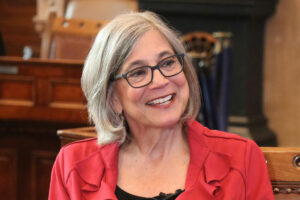
Interview of Susan Wagle, December 18, 2020
Interviewed by Alan Conroy
Former Kansas legislator Susan Wagle describes her interest in politics as "evolving over time." In this interview she candidly talks about her journey to become the first woman to break the glass ceiling and be elected to the top leadership position in the Kansas Senate. And she held onto the Senate Presidency for two terms. Wagle cites several events as having shaped her decision to run: getting a free pregnancy test and learning it was from an abortion clinic; seeing the huge property tax bills resulting from classification and reappraisal and how they angered people; enactment Show Moreof bingo legislation that affected he business negatively--all of which led to awareness that government could have an impact on families and businesses. Once in the Legislature, Wagle developed legislation to control property taxes. When an incumbent left a Senate seat, Wagle moved to the other chamber. She formed alliances in both the House and Senate with a group of conservative legislators enabling her to attain leadership positions. Wagle authored the Woman's Right to Know Act and solicited support from a prochoice Senator to get it passed--the first pro-life legislation. As a committee chair Wagle felt she had greater ability to pass bills that were needed. The issues she addressed ranged from protecting ground water from corporate hog farming, to tax-limiting measures, to ethics. Wagle credits her many years of service to listening to her constituents on issues such as taxation, quality of life, and education. In the closing of this interview, Wagle talks about her last year with COVID which she describes as "horrific" and disruptive. She reflects on her accomplishments changing the Board of Healing Arts and dealing with the Bioscience Authority. Show Less

Interview of Joan Wagnon, May 11, 2018
Interviewed by H. Edward (Ed) Flentje
Ed Flentje's interview of former Representative Joan Wagnon is lengthy and complete, covering her 12 years in the state legislature, 4 years as Mayor of Topeka, and 8 years as Secretary of Revenue. She talks about the work of the House Taxation Committee in implementing legislation after passage of a constitutional amendment classifying property for tax purposes. Wagnon discusses the 1992 school finance lawsuit which produced massive change in the school funding formula, including how the concepts were developed and what strategies were used to get them passed. The interview covers in detail how the House Democrats interacted with Show MoreGovernor Finney in the 1991 session, when Finney vetoed the major tax bill and the Supreme Court found the school finance formula to be unconstitutional. Wagnon served as facilitator for the Children's Initiatives Committee which Speaker Marvin Barkis chaired. That committee produced fourteen bills that affected children and families. Economic development issues are discussed in the last part of the interview which links Wagnon's legislative interests to her work as Mayor of Topeka: neighborhood revitalization, spreading the tax base from city to county for Washburn University and the library, and developing economic development infrastructure to attract growth and new business for Topeka. She also discusses some of her eight years as Secretary of Revenue, particularly her involvement with the Streamlined Sales Tax.
A version of this interview is also posted on KansasMemory.org, the website of the Kansas Historical Society. Show Less
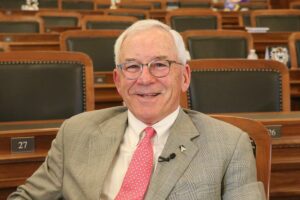
Interview of Mike O'Neal, April 16, 2021
Interviewed by Alan Conroy
Former Speaker Mike O'Neal's interview covers his 28 years in the Kansas House and his impact as Chair of the House Judiciary Committee on the Kansas legal system, both criminal and civil. In fact, O'Neal chaired the House Judiciary Committee three different times totaling 13 years and also served as Chairman of the House Education Committee and a redistricting committee in 2002. He has been involved with workers compensation issues and medical malpractice. O'Neal explains his own evolution in thinking as he, and his constituents, became more conservative. He candidly discusses his race for Speaker of the Show MoreHouse and compares the leadership styles of other speakers with whom he served. O'Neal left the House in 2012 after finishing his second term as Speaker to take a position with the Kansas Chamber of Commerce as its chief executive officer. After four years with the Kansas Chamber he retired to open his own legal consulting and governmental relations firm, O'Neal Consulting, LLC. Show Less
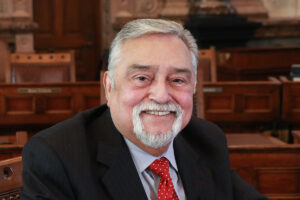
Interview of Paul Feleciano, February 11, 2022
Interviewed by Eric Sexton
Paul Feleciano served from 1972 until 2003 in the Kansas Legislature, primarily in the state Senate. During his 31 year tenure he has served on almost every committee. His interview discusses a wide range of issues including groundwater management, mental health reform, changes in the penal system, but his descriptions of the personalities of Senate leadership make that era come alive. He characterizes the men and women serving in the 1970's and 80's as giants --articulate, caring, compassionate problem solvers who would work "across the aisles" to make things happen. As the legislature moved into Show Morethe 21st Century, Feleciano notes the split in the Republican Party between conservatives and moderates became a real problem because the impact was, "they didn't want to compromise." After leaving the legislature, Feleciano was appointed to the Kansas Parole Board and served there for six years. Show Less

Interview of Lawton Nuss, July 27, 2022
Interviewed by Richard Ross
Retired Chief Justice Lawton Nuss describes his attempts to be appointed to the Court of Appeals (he was not) and to the Supreme Court. Nuss served as Acting Chief during the illness of Chief Justice Davis. After becoming Chief Justice in 2010 he became the chief spokesman and administrator for the entire judicial branch of nearly 1600 employees and 250 judges. In 2014-15 he appointed a Court Budget Advisory committee to help resolve an eight million dollar budget shortfall. He discussed at length the legislative reaction to the Gannon v State school finance case which was Show Morefiled in 2010 and not finally resolved until 2019. Nuss describes his work with the conservative leadership in the state legislature, and a conservative governor, and their attempts to gain more control over the courts. He dealt with budget shortfalls that resulted in closing the courts; attempts to elect rather than appoint judges; and threats to change the role of the courts in the constitution. Nuss was a vigorous defender of the judicial system's independence against legislative interference. He cited the Supreme Court’s Solomon case which essentially answered the question, "‘Should the judicial branch have to give away some of its power granted directly by the people in their Constitution in order to get funding from the legislature.” The court's decisions on school finance continued to provoke the legislature during his tenure. Show Less
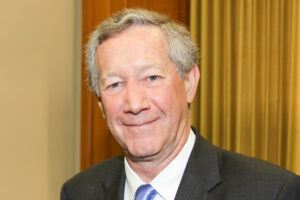
Interview of John Vratil, September 13, 2022
Interviewed by Joan Wagnon and David Heinemann
Senator John Vratil served 14 years in the Kansas Senate, chairing the Judiciary committee 8 of those years and serving as Senate Vice-President for 10 years. Vratil was a leader in the Senate on both education issues as well as judiciary issues. He served on the Judicial Council helping the courts coordinate policy initiatives with the Administration and Legislature. He discusses the change in the power structure of the Senate, from "moderate Republican to Right Wing Conservative." He cites medicaid expansion as one example of a popular issue with the public, but not with the new "right-wing" Show Moreconservative majority. He comments the declining number of lawyers in both the Senate and House may be due to the low salaries. Show Less
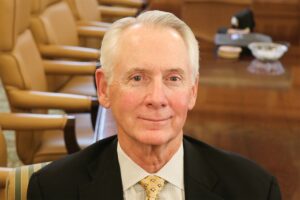
Interview of Bill Graves, December 5, 2022
Interviewed by Mike Matson
Matson's interview of Governor Graves shows the deep respect Matson has for the man he describes as "the last of the centrist, moderate Republican Kansas governors." The interview reveals the values that guided Graves throughout his 8 years in office--to whom much is given, much is expected. It shows how a well-grounded young man dealt with the news that the career for which he had prepared was no longer an option, and how he earned the respect of 73 percent of the state's voters by winning a second term for Governor. Graves talked about his three most Show Moredifficult decisions: replacing a US Senator (Dole), concealed carry and abortion restrictions. Graves concludes with a discussion of issues he thinks the Republican party should be embracing in the future. Following the interview, Matson wrote a column which summarized Bill Graves' success. It is worth reading. (Download it after the interview transcript.) Show Less
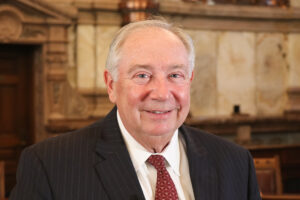
Interview of Jim Denning, April 13, 2023
Interviewed by Alan Conroy
Jim Denning served four years as Majority Leader for the Kansas Senate. His interview reveals his Western Kansas leanings, despite having worked, lived and represented Johnson County. HIs legislative interests included health care policy, funding KPERS and school finance. He described Senate Bill 9--KU Cancer designation--as one of his important contributions. Denning found that Governor Brownback’s tax plan was creating problems for Kansas – “too deep and unsustainable.” His philosophy was, "At the end of the day, you have to govern." Throughout his tenure in the Senate, Medicaid expansion was a pressing issue, but Show Morehe didn’t like the way the bills were constructed, so he developed a Republican alternative that he thought would be a model for the country. His interview details how he kept the Democratic alternative from passing, but his own bill was caught up in abortion politics and failed to pass. Denning led the Senate during 3 special sessions: school finance, COVID and repealing the Brownback tax plan. Historians will love this interview because of his candor and his position at a pivotal time in the legislature's history. Show Less

Interview of Jim Gartner, February 16, 2024
Interviewed by Chris Courtwright
This interview sheds light on several activities related to the Kansas Legislature, particularly the role of lobbyist in decision making and the role of school boards in governance of education. It begins in 1967 with quite a tale of Gartner's service as a young Marine, wounded in VIetnam and how that impacted his career choices. A brief work experience building tires at Goodyear convinced him to get a college degree. Southwestern Bell Telephone hired him as one of the first male telephone operators in Kansas. He ended up as Vice President of External Affairs many years Show Morelater. He began his lobbying career in 1987 partnered with Denny Koch. Together they helped define deregulation and worked with both the legislature and the Kansas Congressional Delegation. In 2009 Gartner was appointed to the USD 437 school board to fill a vacancy. That's where he learned about school finance and governance. In 2016 Rep. Annie Tietze resigned and Gartner won that legislative seat. The House Taxation Committee was a logical appointment, given his lobbying background. The Brownback Tax Experiment was failing, and the legislature was eager to repeal it. Brownback vetoed the bill passed by the legislature; they quickly overrode his veto and restored more conventional tax policy. The interview concludes with a discussion of the food sales tax exemption proposed by Governor Kelly and Gartner's frustration with the legislative process and how it changed over the 30 years of his involvement. Show Less

Interview of Ed McKechnie, February 9, 2024
Interviewed by Chris Courtwright
This lengthy and wide-ranging interview is full of interesting stories about how the legislature worked when its leaders realized the House Democrats were in the majority by one vote (1990 election) with a new Democratic governor. The 1991-92 session was historic because of the major changes in property taxes and school finance. McKechnie built relationships across the aisle which helped him accomplish things and pass legislation. His interview is replete with descriptions of legislators with whom he worked. McKechnie served on the Kansas Bioscience Authority and after its demise, on the Kansas Board of Regents. Show More He discussed the transition of the University of Kansas Hospital to being designated a major cancer center. One particularly interesting story for football fans is about the major conference realignment that occurred from 2011 to 2012. He described in detail the negotiations over which university would stay or leave the Big XII. Ordinarily the Regents would not have been involved, but the impact of these decisions was too great to ignore. McKechnie also talks about the decisions the Regents made about raising tuition. Show Less
